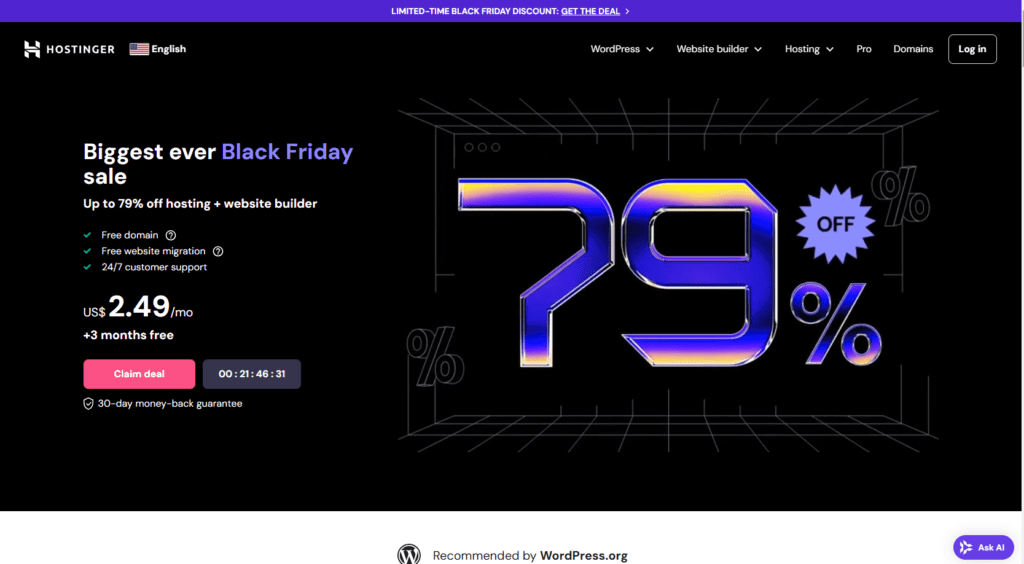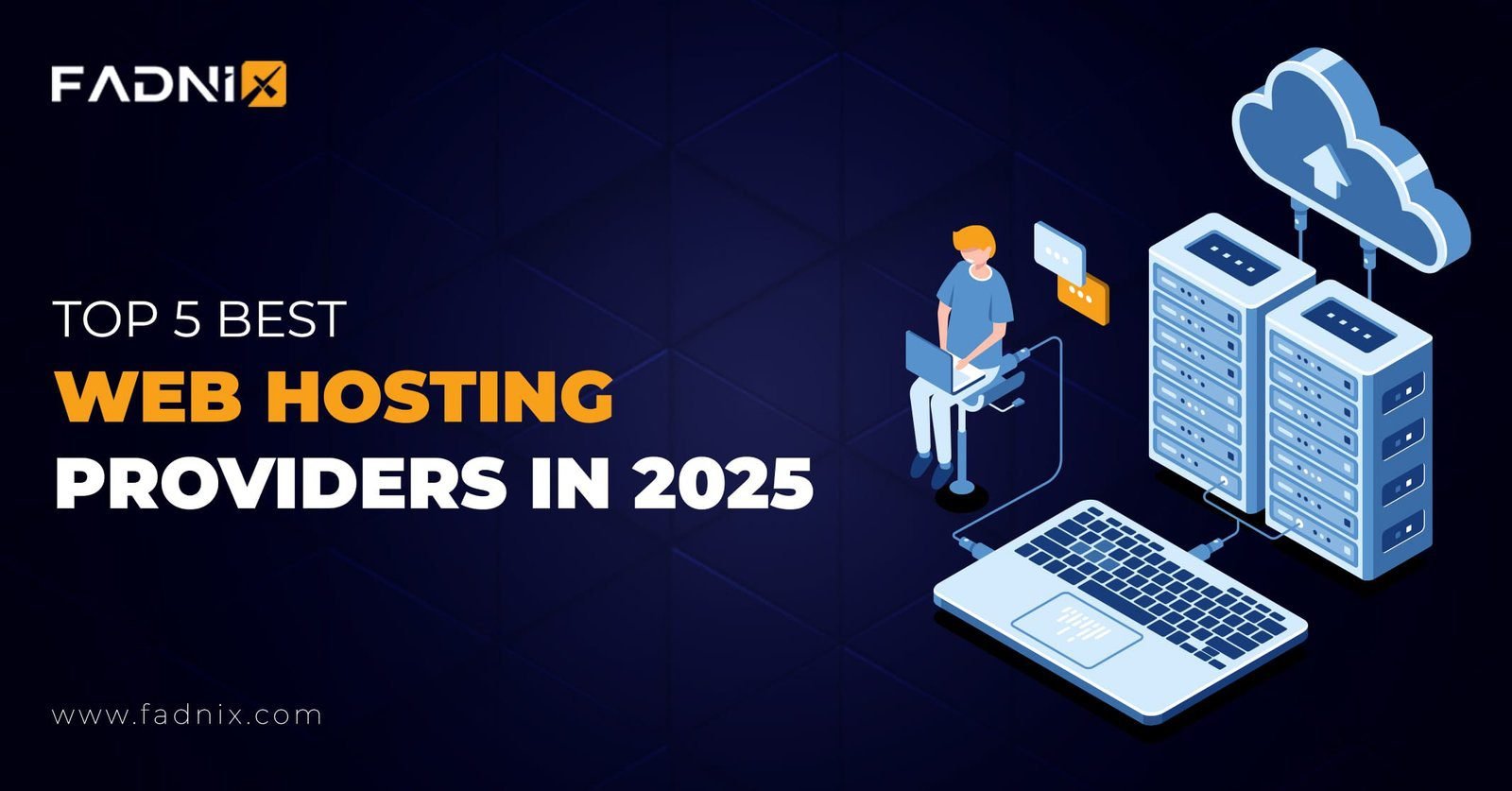Subtotal ₨ 0
Introduction
Choosing the right web hosting provider is one of the most critical steps when launching a website. With countless providers offering a variety of services, finding a host that meets your specific needs in terms of speed, reliability, and support can be challenging. This article dives into a detailed comparison of the top five best web hosting providers for 2025: Hostinger, GoDaddy, Namecheap, HostGator, and A2 Hosting. From affordability to performance, this guide will help you make an informed choice.
What to Look for in a Web Hosting Provider
When evaluating web hosting providers, it’s essential to consider several factors:
- Performance and Speed: Look for providers with optimized server speeds to reduce loading times.
- Uptime and Reliability: Reliable hosts should guarantee at least 99.9% uptime.
- Customer Support: 24/7 customer support is essential, especially if you’re new to web hosting.
- Pricing and Plans: Find a plan that fits your budget and offers flexibility as your website grows.
- Scalability: A good hosting provider should offer options for scaling up as your site’s traffic increases.
Hostinger: Affordable Hosting with Powerful Features

Hostinger is a popular choice for users seeking affordable yet high-performance hosting. Known for its low-cost plans and user-friendly interface, Hostinger provides features that cater to small businesses, personal websites, and startups. It offers shared, VPS, cloud, and WordPress hosting options.
- Key Features:
- Free SSL certificate and domain (on some plans)
- Easy-to-use control panel
- 99.9% uptime guarantee
- 24/7 multilingual customer support
- Website builder and one-click installer for WordPress
- Pricing: Hostinger offers some of the most competitive rates, starting from $1.99 per month.
- Pros and Cons:
- Pros: Extremely affordable, good performance for the price, beginner-friendly.
- Cons: Limited resources on basic plans, no phone support.
- Best For: Users on a budget, beginners, small businesses needing reliable hosting without the premium price.
GoDaddy: Known for Domain and Hosting Services

GoDaddy is one of the largest hosting and domain registration companies globally, known for its wide range of services. In addition to hosting, GoDaddy provides domain registration, website builders, and digital marketing tools, making it ideal for businesses seeking an all-in-one provider.
- Key Features:
- Integrated website builder
- Free professional email for the first year
- 99.9% uptime guarantee
- 24/7 customer support
- Extensive range of hosting plans (Shared, VPS, Dedicated, WordPress)
- Pricing: Starting at $5.99 per month, GoDaddy’s pricing is slightly higher than Hostinger, but it often offers discounts for new customers.
- Pros and Cons:
- Pros: All-in-one services, reputable brand, easy domain and hosting management.
- Cons: Upselling on additional services, renewal rates can be higher.
- Best For: Small to medium-sized businesses needing integrated domain and hosting services.
Namecheap: Best for Domains and Affordable Hosting

While Namecheap is best known for its domain registration services, it also offers affordable hosting options, ideal for beginners and smaller websites. Namecheap’s hosting services come with essential features and user-friendly tools for efficient website management.
- Key Features:
- Free domain on certain plans
- Unmetered bandwidth
- Easy WordPress installation
- 24/7 customer support
- Reliable uptime
- Pricing: Namecheap’s shared hosting starts at $1.58 per month, making it one of the most affordable options.
- Pros and Cons:
- Pros: Affordable plans, easy domain management, free privacy protection on domains.
- Cons: Basic customer support compared to premium providers, limited advanced features.
- Best For: Beginners, small websites, and budget-conscious users who also need domain registration.
HostGator: Reliable and Beginner-Friendly Hosting

HostGator is another well-known provider, offering a wide range of hosting options that cater to different needs, from blogs to small business websites. HostGator is known for its reliability, ease of use, and solid customer support.
- Key Features:
- Free website migration
- Free SSL certificate
- Unmetered bandwidth
- 24/7 customer support via chat, phone, and ticketing
- Simple control panel
- Pricing: HostGator’s pricing starts at $2.75 per month, making it affordable and competitive with similar providers.
- Pros and Cons:
- Pros: User-friendly, affordable, excellent uptime.
- Cons: Extra fees for some add-ons, basic plans lack advanced features.
- Best For: Bloggers, small businesses, and users looking for a straightforward hosting provider with reliable support.
A2 Hosting: High-Performance and Speed-Focused Hosting

A2 Hosting is known for its emphasis on speed and performance, offering Turbo Servers that claim to load sites up to 20 times faster than average servers. This focus on speed makes A2 Hosting a popular choice for sites where performance is a top priority.
- Key Features:
- Turbo servers with faster load times
- Free website migration
- 99.9% uptime guarantee
- 24/7 Guru Crew support
- Unlimited storage and bandwidth (on some plans)
- Pricing: Plans start at $2.99 per month, with Turbo plans available at higher rates.
- Pros and Cons:
- Pros: Excellent speed, robust customer support, free migration.
- Cons: Higher cost for premium plans, standard shared hosting may not offer the same speed benefits.
- Best For: Websites requiring high performance, eCommerce sites, and speed-focused users.
Comparison of Features and Pricing
| Provider | Starting Price | Free SSL | 24/7 Support | Uptime | Best For |
|---|---|---|---|---|---|
| Hostinger | $1.99/month | Yes | Yes | 99.9% | Budget websites, beginners |
| GoDaddy | $5.99/month | Yes | Yes | 99.9% | All-in-one services, SMBs |
| Namecheap | $1.58/month | Yes | Yes | 99.9% | Beginners, low-cost sites |
| HostGator | $2.75/month | Yes | Yes | 99.9% | Bloggers, small businesses |
| A2 Hosting | $2.99/month | Yes | Yes | 99.9% | Performance-focused users |
Pros and Cons Summary for Each Provider
- Hostinger: Affordable and beginner-friendly but limited support on basic plans.
- GoDaddy: Integrated domain and hosting solutions, but upselling can be a downside.
- Namecheap: Excellent for low budgets and domain management, with limited advanced features.
- HostGator: Reliable and easy to use, though basic plans may lack some advanced tools.
- A2 Hosting: High speed and performance focus, though premium features come at a cost.
How to Choose the Right Web Hosting for Your Needs
To choose the right hosting provider, consider your website’s specific needs. For example, if you’re launching a personal blog or small business site, affordable options like Hostinger or Namecheap may suit you best. For performance-focused sites or eCommerce platforms, A2 Hosting’s speed-optimized plans might be ideal. GoDaddy and HostGator are excellent for users who prefer a balance of features, support, and ease of use.
Conclusion
Selecting the best web hosting provider depends on your priorities, whether they’re affordability, performance, or customer support. Each of the providers covered in this guide has unique strengths and is suited for different types of users. By understanding what each offers, you can make an informed choice that meets your website’s goals and budget.
FAQs
What is the best web hosting provider for beginners?
Hostinger and Namecheap are highly recommended for beginners due to their affordability and ease of use.
Which hosting provider is best for speed and performance?
A2 Hosting is known for its Turbo Servers, making it an excellent choice for speed-focused users.
Does GoDaddy provide good customer support?
Yes, GoDaddy offers 24/7 customer support and an extensive knowledge base for users.
Is HostGator good for eCommerce websites?
Yes, HostGator offers reliable plans with unmetered bandwidth, making it suitable for small eCommerce sites.
Can I transfer my website to a new hosting provider?
Most hosting providers, including HostGator and A2 Hosting, offer free migration services.
What should I prioritize when choosing a hosting provider?
Consider uptime, support, pricing, and features that match your website’s purpose, like speed for eCommerce or affordability for blogs.


Comments are closed